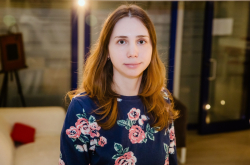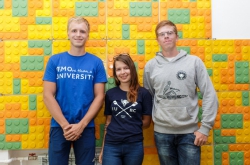You’ve been focusing on research since the very start of your Master’s program. Why exactly did you choose to work in the Computer Technologies laboratory?
From the time I applied to ITMO University, I knew that I’ll be focusing on research projects, and chose the one that I’ve already been doing for a year. It wasn’t in St. Petersburg that I did my Bachelor’s program, before that, I studied applied physics and mathematics. We did get some training in programming, but that wasn’t much, as we mostly focused on physics. After I graduated, I decided that I want to learn to code better. On the other hand, I already had a keen understanding of natural sciences, so I thought: why not continue my education at ITMO University, where they train the world's best programmers?
I applied to different universities; in some, I had to take exams, in others, I participated in portfolio contests. Still, no one ever told me about the tasks I’d be focusing on at every particular university or laboratory. Sure enough, it is possible to find such information on the Internet, but research topics constantly change, so this information is often outdated.

After I completed my Bachelor’s program, I felt a bit lost, as I didn’t exactly understand what I wanted. Here at ITMO’s Computer Technology Department, they told me about the many opportunities I had, showed me around the laboratory and explained their current projects. In my experience, ITMO is the only place where they do such a thing.
Tell us about the projects you’ve been working on lately.
For now, I’ve been focusing on such fields as chemoinformatics, stereochemistry, spatial geometry, and stereometry. We are currently developing a machine learning-based system that will offer means for producing particular compounds while spending less catalysts. This is quite a complex task, as we don’t really know how exactly catalysts are spent in a reaction. Such research is also relevant: if some catalyst is expensive, minimizing its consumption is very important. By using machine learning, we hope to not just go through all possible reactions, but apply particular rules in order to forecast the most favorable ones.
The practical importance of our research is that it can help make drug production less expensive. On the whole, there are many projects in this field, some of which are also based on using machine learning technologies. Still, the concept that we are currently developing is something I’ve never seen before.
You’re working in an interdisciplinary field. Is having good programming skills enough for you, or do you have to learn the adjacent fields of science, as well?
It’s important to be knowledgeable in the fields you’re working in, and to also be able to code all of that. Much as the machine that we are training, I have to understand which approaches won’t work, and the restrictions to be introduced. Knowing this sure is interesting; still, my tasks don’t imply having in-depth expertise in these things.

Every member of our team has tasks of their own, but we are always open to collaboration, and often consult with people from other fields. For example, we regularly communicate with chemists who work at the university.
So what do you think: is being knowledgeable in interdisciplinary fields important for a modern programmer?
It depends on what kind of a programmer one wants to become. There are those who want to do applied mathematics, and those who just want to work for the industry. The former take knowledge from adjacent fields and use it in their code. The latter are less interested in such things, though they often have to work in different fields, and have to have a keen understanding of economic processes or usability, for instance. Still, if one’s work is more about algorithms and technical issues, that can soon get boring. In interdisciplinary fields like applied mathematics, there’s less routine, and you often get an opportunity to learn something new.
This is one of the reasons why science is so interesting. What’s more, even if I use someone’s frameworks, I always study how exactly they operate. There are many box solutions in the industry, but it’s still important to understand them, otherwise you’ll be dealing with various problems later on. When you don’t know how a box solution works, you’ll just ruin everything. As result, you’ll have to do everything over.
What do you think, to which extent are specialists focusing on Computer Science relevant in today’s market? Most career opportunities in IT are associated with industrial developers.
Over the past two years, my idea of scientists and their work has changed much. There are major companies like Jet Brains or Google which pay much attention to science-driven tasks and have full-fledged research departments. I believe that thanks to such support, the scientists’ image also changes. Companies give financial assistance to universities and offer help by providing laboratory equipment. And when young specialists and scientists feel the support of major companies, they understand that they’ve made the right choice.
I believe that in future, companies will get all the more interested in hiring researchers and specialists who know their way in different fields in different fields and can work on interdisciplinary projects.

On one hand, you study and work on your project at the Computer Technologies laboratory, on the other, you’ve recently become a Master of Sports in orienteering. How long have you been doing this sport, and how do you manage to combine this activity with your work?
I’ve been doing orienteering since I was six or seven. When I was a kid, my father put me in a skiing section, where we did orienteering a lot. At first, I practiced under supervision, because the forest is a vast space that you can easily get lost in; also, there are many symbols and numerals in maps that a small child can get difficulty understanding. In some time, I started to do orienteering by myself. Sometimes it gets hard, especially if you don’t get many opportunities to train. It’s also quite hard to combine sports and studying. There is an orienteering club at ITMO University, as well, but its members are few.
Why?
It’s not easy. If you don’t have a car, you have to go by train, then pay the participation fee. If it starts to rain, you still have to go. For those unfamiliar with orienteering, all of that sounds quite unattractive. Also, it seems to me that nowadays it’s sports tourism that gets the most support, which is why it would really be great if things were the same with orienteering. There are several enthusiasts at ITMO who did orienteering before they entered the university. Still, it would’ve been great if the university helped them helped them promote this great sport, as it has many positive sides.

For example, since urban sprints started to gain popularity, it has become possible to conduct GPS broadcasts, where the participants’ movements are shown on a map, and spectators can trace their progress throughout the route. This gets really spectacular if the contestants have a common starting time: it feels as though you observe the whole competition from above.
Each race is unique: when you stand at the starting line, you don’t know what awaits you. Though you can get the general idea of a urban quarter’s environment by looking at it in Google maps, forests are much different. This leads to various mistakes that you eventually make, but you still get to enjoy yourself, as you know that you’ve succeeded in overcoming your emotions and completing the race.
By the way, emotions are a very important factor in orienteering. If you get too emotional, you lose the calm that you need to complete the race. On the other hand, if you lack emotions, you don’t have the necessary motivation to give it all and run as fast as you can while making the right choices. The pleasure you get from completing a race really motivates you, though you always get the feeling that you could have done it even better.

It sounds as if orienteering has a lot in common with what you told about research tasks. Do you perceive sport as an opportunity to unwind from science, or rather as a source of inspiration for your work?
Orienteering is definitely a great way to unwind. What is more, since I started my latest research project, I learned that it also helps me understand geometry, namely the concept of hypersurface. By changing different factors, we can change a structure’s energy. In other words, there’s a dependence from multiple variables, and this very function is hypersurface. Though it looks like a curve in two-dimensional space, in three-dimensional space it’s resembles our world, its geography. With bigger dimensions, you have to work with hypersurfaces that are hard to visualize. Orienteering helps me understand them better by imagining how I travel through it as though I were running in a forest. In this way, orienteering helps me better understand multidimensional space.
In any case, orienteering, mush as scientific conferences, seems like a good opportunity to see the world.
It is definitely so. Most of my travels have to do with orienteering. I got to see many of Russia’s regions: Karelia, Mordovia, Orel, Vladimir, Nizhny Novgorod and Pskov Oblasts, the Komi Republic and Ural. I do orienteering a lot in my home Samara, and I’ve also been to Finland where we mostly ski, as it’s not easy to run when you are knee-deep in snow.
Nevertheless, I now want to focus more on scientific conferences, as I’m interested in practicing my English skills, showing my research results to the scientific community, and getting assessment of my work.




